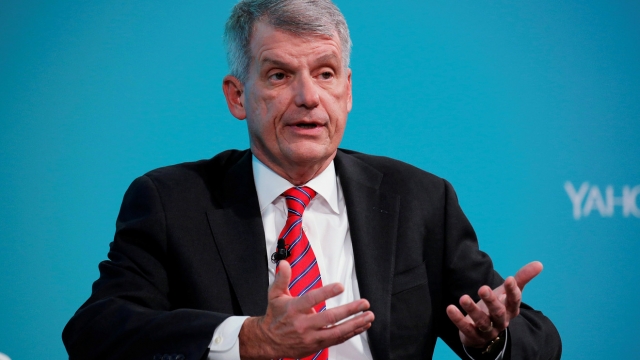
Wells Fargo’s woes mount, but Wall Street seems to have moved on
http://ift.tt/2yJY2Og
There were questions about loan growth, credit quality, and home equity lines of credit. There were several about closing branches as customers embrace mobile banking, and one on interest rates – all very standard questions for analysts to ask on a bank earnings call.
But Wells Fargo & Co.
is not a standard bank – or at least not a bank in a standard situation.
Just a few weeks ago, several members of Congress raked the bank’s CEO, Tim Sloan, over the coals for the ongoing customer fraud scandals that have engulfed the bank for over a year.
“At best you were incompetent, at worst you were complicit. And either way you should be fired,” Sen. Elizabeth Warren, the populist Democrat from Massachusetts, told Sloan.
Sen. Brian Schatz, a Hawaii Democrat, asked Sloan why regulators shouldn’t simply shut down the bank, a question Sloan struggled to answer.
Read: ‘What in God’s name were you thinking?’ senators grill Wells Fargo CEO
But on the bank’s third-quarter earnings call Friday, equity analysts took a completely different tone. In fact, it took over half an hour for the call’s sole “sales practices” question, from Matthew O’Connor of Deutsche Bank, to emerge.
“Tim, so you’ve been CEO now for about a year,” O’Connor began.
“A year and a day, I think,” Sloan cut in. “Maybe two, I don’t know. It seems like forever, Matt.”
O’Connor pressed on. “So now that you’ve been there for some time, do you feel like you’ve identified all of the issues related to – just call it sales practices and tactics that have become headline issues for the stock and obviously weight on results as well? Do you feel like you’ve identified those issues?”
There’s an obvious logic to O’Connor’s question. The bank’s scandal first surfaced in Oct. 2016, when it announced a settlement with regulators for the customer abuses. Then-CEO John Stumpf went to Capitol Hill to answer for illegally opening nearly two million customer accounts.
The bank made leadership changes, including terminating Stumpf and elevating Sloan. It also began to reach out to customers to offer restitutions, and to train and streamline the management team for the retail division.
But then this summer, Wells Fargo disclosed that it had discovered that the number of unauthorized account openings was nearly double the original count. And a New York Times investigation determined that the bank’s shady customer practices extended to forcing unneeded auto insurance on hundreds of thousands of customers without their knowledge — a practice which caused many to overdraw their accounts, pay excessive fees, or even have their cars repossessed.
Earlier this month, several senators asked Sloan a version of the question O’Connor posed, but most felt they didn’t get a satisfactory response.
“‘I’m not familiar’ is not an answer we should be hearing,” Sen. Heidi Heitkamp, a North Dakota Democrat, told Sloan toward the end of the hearing. “I do not hear a level of culture change that satisfies me today and I think that’s something that’s very problematic for Wells Fargo going forward.”
On the earnings call, Sloan’s immediate response to O’Connor had a ring of corporate PR-speak (Wells’ actual PR department declined to comment to MarketWatch.)
“Well, Matt, we’ve been working very hard to identify all issues. I’m very pleased with the progress,” Sloan began, before catching himself. “Obviously, I’m not necessarily pleased that if you find something, it sometimes is not particularly positive. But we’ve made a commitment to look through everything. And be very disclosive and appreciate that that can create a headline, and weigh on the company and stock and team members and other stakeholders but we’ve made a lot of progress. I can’t commit to you, Matt, that we’ve finished everything because things are still in progress. But we’re very far along.”
It’s worth noting that Wells Fargo’s stock has lost nearly 3% in the year to date, a period in which a broad basket of bank stocks included in the KBW Bank Index
have gained 8%, and some competitors are trouncing Wells, like Citigroup Inc.
, which has gained 21.6% so far this year.
“Yes, I can appreciate it’s hard to put a timeframe on it, but I do think it’s important to come out when you feel confident and say that these legacy issues have been addressed, we’ve turned the page and we’re moving on,” O’Connor said.
The rest of the analysts on the earnings call seemed to have moved on. There were no other questions about the “sales practices” — even when there was one.
“Your primary checking account customers have essentially been flat over the last year,” Saul Martinez, an analyst with UBS, began.
“That compares to the sort of mid- to high-single digits historically,” Martinez continued, “and it’s really decelerated since the second quarter of last year. At some point, does it suggest that maybe you do have to start to become a little bit more aggressive in terms of deposit pricing on the retail side as well?”
It fell to Wells Fargo’s CEO to remind Martinez that there were other reasons why customers may have shied away from his bank over the past twelve months.
“I think the reason for that is because we’ve been through and are going through a transformation in our retail business,” Sloan began.
“And when you think about how the sales practices settlements and related reputational impact affected our team and our customers, particularly in the third and the fourth quarter.”
After some more discussion of the “fundamental changes” at the bank, he concluded, “I mean, just there’s been so much going on.”
Read: Where was KPMG, Wells Fargo’s auditor, while the funny business was going on?
business
via MarketWatch.com – Top Stories http://ift.tt/dPxWU8
